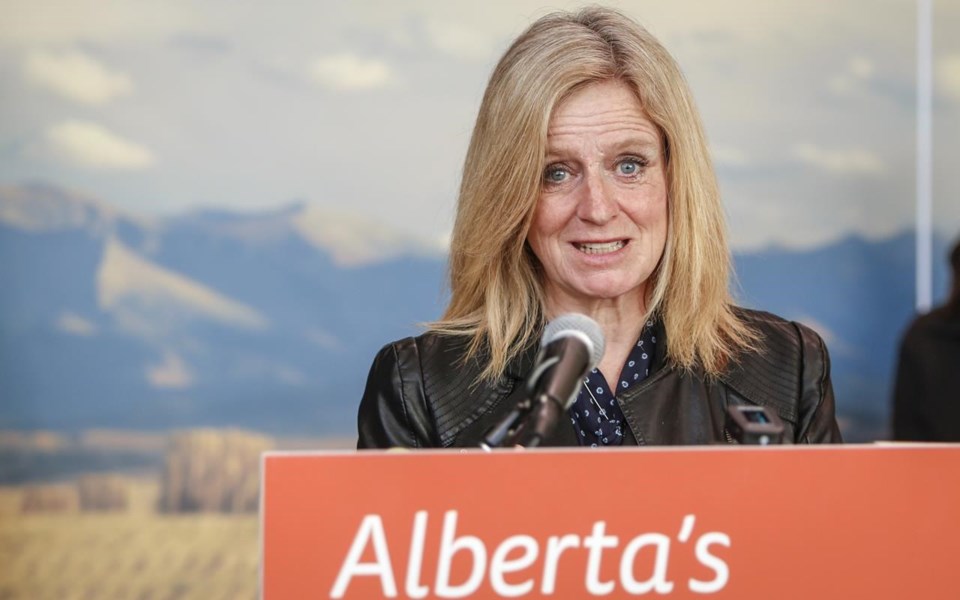EDMONTON — Alberta’s Opposition NDP leader has demanded a public guarantee from Premier Danielle Smith that she will follow through on her promise to hold the next general election on its scheduled date next spring.
Rachel Notley, in a letter sent Friday to Smith, said the United Conservative premier is trampling on Albertans’ democratic rights by promising to implement radical policy changes without first seeking a popular mandate.
“Since Oct. 6, when you were selected as leader of the United Conservative Party by 1.5 per cent of eligible voters, you have telegraphed an intention to implement several extreme policy choices that have never been put before the people of this province,” wrote Notley.
“To suggest you have a mandate to act on these plans prior to a provincial vote is dismissive of Albertans’ democratic rights.
“To extend the legislated date of this vote would be genuinely destabilizing to our provincial economy and our democracy. My message to you is simple — end the instability. Go public today and confirm to Albertans that the election will be held on May 29, 2023.”
Becca Polak, the spokesperson for Smith, responded in a statement: "As Premier Smith has stated multiple times, the government will respect the fixed election date of May 29, 2023."
Smith has long promised to hold the election that day and has not hinted or suggested she is reconsidering such a move.
However, the scope of her planned changes has led to speculation she might delay the vote to its full five-year mandate — an extension that is legal but rarely used.
Smith has promised to reorganize and decentralize Alberta Health Services, pursue a separate Alberta police force, introduce health spending accounts for every Albertan and replace the chief medical officer of health.
She has also said her government would forbid mask mandates in schools and provide discrimination protection for those who choose not to get vaccinated for COVID-19.
On Oct. 3, days before she won the UCP leadership to replace then-premier Jason Kenney, Smith told reportersshe would honour the May 29 election date.
"When early election calls occur, the public is suspicious," she added. “They think that there’s some advantage that the person is trying to gain.”
On Oct. 8, at a news conference in Medicine Hat, Smith used the fixed election date as a reason why she was calling a byelection in Brooks-Medicine Hat to gain a seat for herself while not calling a byelection in Calgary-Elbow, which has been vacant since UCP legislature member Doug Schweitzer resigned at the end of August.
“There has been a convention that when a leader is chosen who does not have a seat, there’s an expectation that she will seek a seat at an early opportunity,” Smith said, adding it's also convention not to call byelections in other constituencies within a year of a general election because other candidates may also step away.
“And so I think, rather than have a rolling series of byelections, we may as well just stick with the convention of having the adjacent MLA take care of the issues in the riding and we’ll stick with the fixed election date of May the 29th.”
Voters go to the polls Tuesday in Brooks-Medicine Hat.
A fixed election date was brought in and passed by the UCP almost a year ago in a bill introduced by then-justice minister Kaycee Madu. Madu is now deputy premier and the minister for skilled trades and professions.
The fixed date replaced decade-old legislation that called for elections within a three-month window in the spring every four years. The new law specifies voters go to the polls in a general election on the last Monday in May every four years.
It was a priority for the government, Madu told the house last Nov. 16 when speaking to the bill.
“Doing this would level the playing field for all political parties. It would remove the advantage the governing party currently has with the three-month election window and increase trust in our democratic process.”
While the date is fixed, it can’t be legally set in stone.
Alberta premiers have the option to call an election for extenuating circumstances, including if they are seeking a mandate on consequential changes or if the governing party loses a confidence vote in the house.
Former Progressive Conservative premier Jim Prentice called an early election in 2015, seeking a renewed mandate on a blueprint for spending and budgeting. His government was defeated by Notley's NDP.
This report by The Canadian Press was first published Nov. 4, 2022.
Dean Bennett, The Canadian Press



